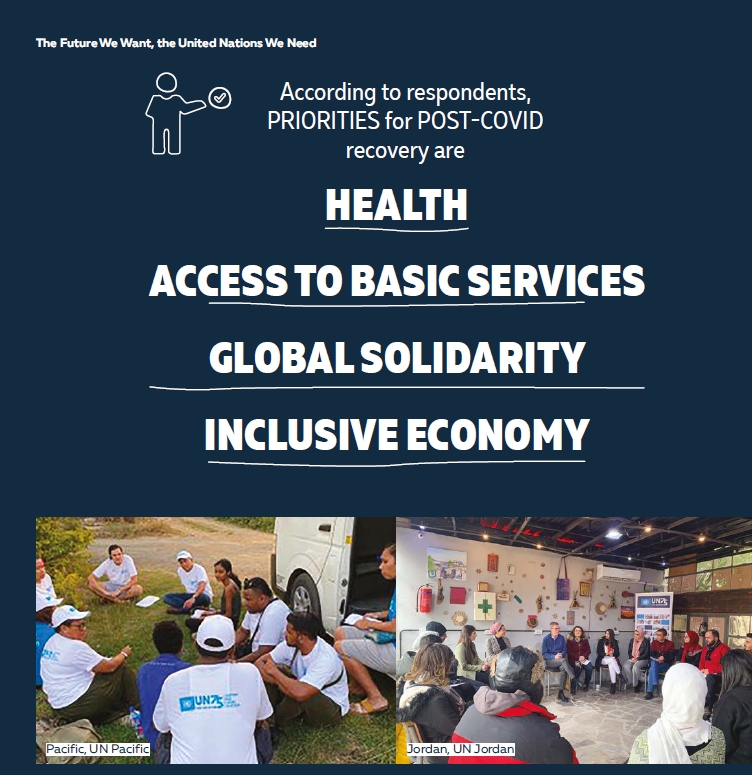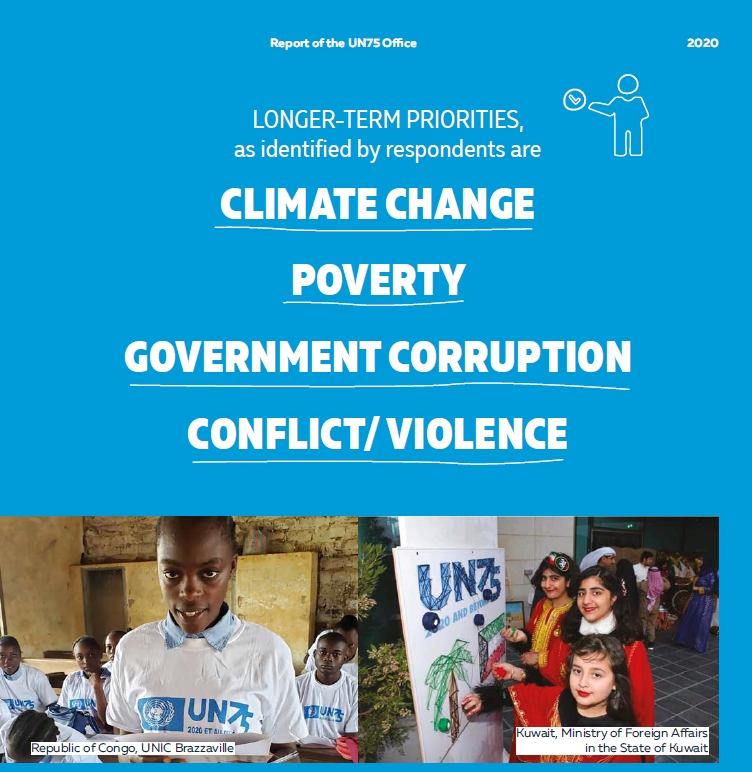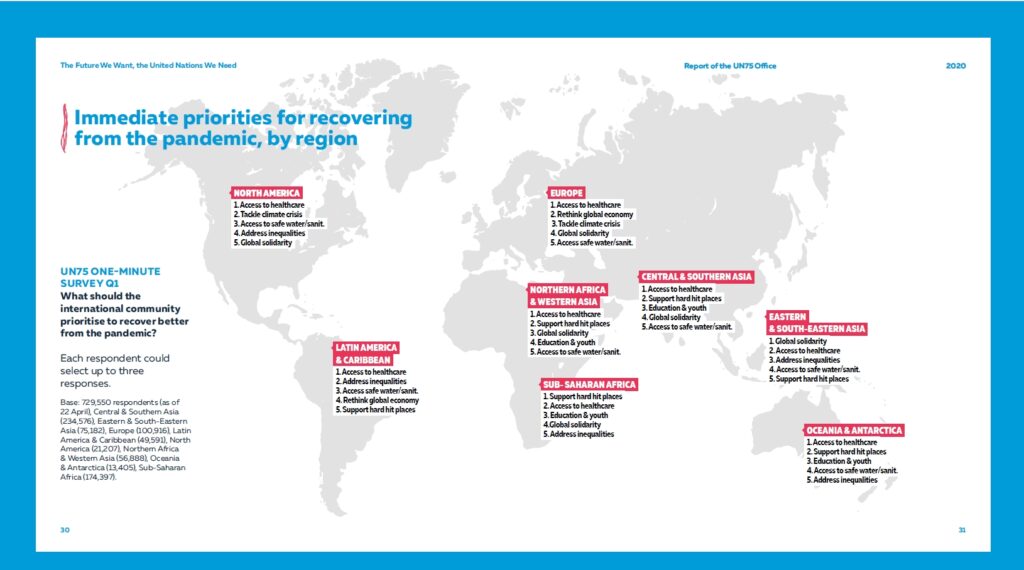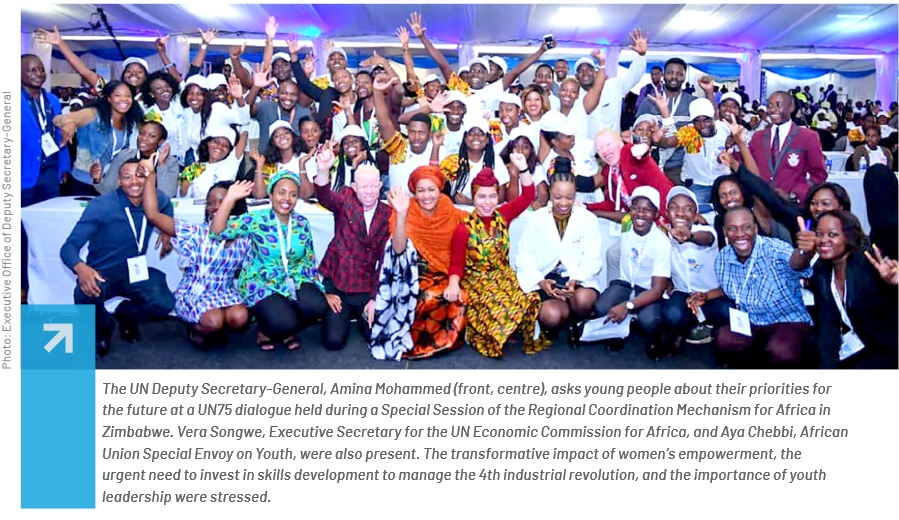 In 1945, 51 nations signed up to the UN Charter, and the United Nations was born. The United Nations serves as a global forum where countries can raise and discuss the most difficult issues, including problems of war and peace. In addition to maintaining international peace and security, the UN protects human rights, delivers humanitarian aid, promotes sustainable development and upholds international law. Here we look to the work of the UN as it engages the world’s inhabitants as to what future they want to see happen with the UN.
In 1945, 51 nations signed up to the UN Charter, and the United Nations was born. The United Nations serves as a global forum where countries can raise and discuss the most difficult issues, including problems of war and peace. In addition to maintaining international peace and security, the UN protects human rights, delivers humanitarian aid, promotes sustainable development and upholds international law. Here we look to the work of the UN as it engages the world’s inhabitants as to what future they want to see happen with the UN.
- Combats pandemics: leads the global response of the unprecedented COVID-19
- Provides food and assistance to 86.7 million people in 83 countries
- Supplies vaccines to 50% of the world’s children, helps save 3 million lives a year
- Assists and protects 82.5 million people fleeing war, famine and persecution
- Works with 196 nations to keep the global temperature rise well below 2°C/3.6°F
- Keeps peace with 95,000 peacekeepers in 13 operations around the world
- Tackles the global water crisis affecting over 2.2 billion people worldwide
- Protects and promotes human rights globally and through 80 treaties/declarations
- Coordinates US$28.8 billion appeal for the humanitarian needs of 108.8 million people
- Uses diplomacy to prevent conflict: assists some 50 countries a year with their elections
- Helps over 2 million women a month overcome pregnancy and childbirth complications

Background – United Nations at 75
In January 2020, the UN Secretary-General launched the UN75 initiative, not as a celebration, but as the world’s largest conversation about current global challenges, and the gap between the future we want and where we are headed if current trends continue.
The Secretary-General saw UN75 as an opportunity for the UN to listen to the people it serves and identify their priorities and suggestions for enhanced global cooperation. UN75 was initiated to better understand people’s hopes and fears for the future, inviting people everywhere to imagine the future they want and contribute ideas on how to make it a reality, building a better and more sustainable world, for all.
Through formal and informal surveys, and dialogues held across the world, the exercise was intended to take stock of global concerns and gain views from across the world on what sort of global cooperation is required. It was also intended to re-imagine what role the United Nations might play in helping to address our global challenges.
After the pandemic made in-person gatherings challenging in many parts of the world, the initiative increased its efforts to reach people online, expanding the one-minute survey and social media outreach to shift the dialogues to online settings, where possible. At the same time, it put more emphasis – and resources – on reaching those without internet access: working with UN offices and other partners on the ground, and through telephone and SMS communications.
By adding questions on building back better from the pandemic, it was able to conduct the largest and most diverse global survey to date on post-COVID priorities.
To date, over 1 million people have taken the one-minute survey in all UN Member and Observer States and more than 1,000 dialogues have been held in 82 countries across the world. In addition, 50,000 in 50 countries took part in independent polling by Edelman and the Pew Research Center, and artificial intelligence analysis of social and traditional media was conducted in 70 countries, along with academic and policy research mappings in all regions.
Together, they represent the UN’s most ambitious attempt to undertake a global reality check and hear from “we the peoples” on their priorities and suggested solutions to global challenges, providing unique insights into the future we want and the UN we need.

Top Ten Key Findings
Across the world, respondents of all origins, genders and age groups are remarkably unified in their fears and hopes for the future:
- Amidst the current crisis,the immediate priority of most respondents everywhere is improved access to basic services: healthcare, safe water and sanitation, and education.
- The next main priority is greater international solidarity and increased support to the places hardest hit by the pandemic. This includes tackling poverty, inequalities and boosting employment.
- While health is the most pressing issue now, respondents were hopeful about this area improving. They also believe access to education and women’s rights will improve.
- When looking to the future, respondents’ priorities corresponded to those areas where they believe things will get worse. Most participants across all regions are worried about the future impact of climate change. Our inability to stem the climate crisis and the destruction of the natural environment is viewed by respondents as the most overwhelming medium and long-term concern.
- Other major priorities for the future include ensuring greater respect for human rights, settling conflicts, tackling poverty and reducing corruption.
- When it comes to the future, younger participants and those in many developing countries tend to be more optimistic than those who are older, or living in developed countries.
- 87% of those surveyed believe international cooperation is vital to deal with today’s challenges. And the majority of respondents believe the COVID-19 crisis has made international cooperation even more urgent.
-
Looking to the past, six in ten respondents believe the UN has made the world a better place. Looking to the future, 74% see the UN as “essential” in tackling global challenges. At the same time, over half still see the UN as remote from their lives and say they don’t know much about it.
Moreover, while just under half currently see the UN as contributing “somewhat” to advancing key global challenges, only about a third see the UN as contributing “a lot” in this regard. The areas where the UN is perceived to be contributing most are in upholding human rights and in promoting peace.
- Dialogue participants overwhelmingly called for the UN to be more inclusive of the diversity of actors in the 21st century. They identified in particular the need for greater inclusion of civil society, women, youth, vulnerable groups, cities and local authorities, businesses, regional organisations and other international organisations.
- Participants in dialogues also called for the UN to innovate in other ways, with stronger leadership and more consistency in exercising its moral authority to uphold the UN Charter. There are calls for increased accountability, transparency and impartiality, including through better engagement and communication with communities, as well as strengthening implementation of programmes and operations.

Covid-19 is a stark reminder of the need for cooperation across borders, sectors and generations. Our response will determine how fast the world recovers, whether we achieve the Sustainable Development Goals, and how well we handle pressing challenges: from the climate crisis to pandemics, inequalities, new forms of violence, and rapid changes in technology and in our population.
But just when we need collective action more than ever, support for global cooperation has been flagging. In many countries, public trust in traditional institutions is in decline and relations between countries have been under strain. Will this pandemic bring the world closer together? Or will it lead to greater mistrust? Global dialogue – and action – is now more urgent than ever.
Amidst the current global uncertainty, the UN75 initiative remains committed to engage people around the world in conversation. We have always placed strong emphasis on online engagement, through virtual events and social media, and we are now scaling up these efforts, in partnership with youth, civil society, busi-ness, media, tech and other stakeholders. We will continue gathering input through the five data streams and we will present our findings in September 2020, at the official commemoration of the UN’s 75th anniversary. After September, UN75 will convene discussions on how best to take forward the findings. We will present the final UN75 report in January 2021.

![]()

